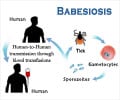
‘This study states that Ivermectin, a drug that can kill mosquitoes, when administered to humans in a tolerable dosage may be a novel and effective treatment for malaria.’
Tweet it Now
Dr. Menno Smit (LSTM) is first author on the paper. He said: "This is an entirely novel type of intervention which could be added to community-wide campaigns with antimalarial drugs, such as mass drug administration and seasonal malaria chemoprevention, to kill both mosquitoes and parasites. We worked with colleagues from Imperial College London, who used our results in a mathematical model, which predicts that the addition of high dose ivermectin increases the impact on malaria reduction by potentially as much as 61 percent." Ivermectin is an antiparasitic drug and in lower doses is widely used in the treatment of other tropical diseases. It has safely been used in doses up to 10 times the standard dose. The team evaluated doses that were predicted to give drug levels that were 2 times and 4 times higher than the standard dose. They combined it with the malaria drug DP which is routinely used in mass drug administration in many malaria endemic countries. They found that three-day courses of ivermectin 300 and 600 mcg/kg/day were safe and routinely killed mosquitoes feeding on the blood of the treated individuals for at least 28 days post-treatment. These results suggest that ivermectin has the potential to become a novel tool for malaria control and elimination.
"This first evaluation of the impact of high dose ivermectin on mosquito mortality is highly encouraging and requires further evaluation in larger scale trials that target both malaria parasites and the mosquitoes, as the world pushes towards malaria elimination", explained LSTM's Professor Feiko ter Kuile, senior author of the paper. "The drug's impact on mosquito mortality, long effect-duration, and tolerability make it a promising new tool in malaria control. It has a different mode of action from other insecticides, meaning that it could also be effective against mosquitoes that rest and feed outdoors, as well as mosquitoes that are resistant to the standard insecticides used on bed nets and indoor spraying."
Preliminary results of the study were presented at a World Health Organization (WHO) evidence review group meeting, while UNITAID has issued a call for further research into the use of endectocide class drugs, of which ivermectin is currently the only one registered for human use, as new vector control tools in the fight against malaria and other mosquito borne disease.
The research is published in the journal The Lancet Infectious Diseases.
Advertisement













